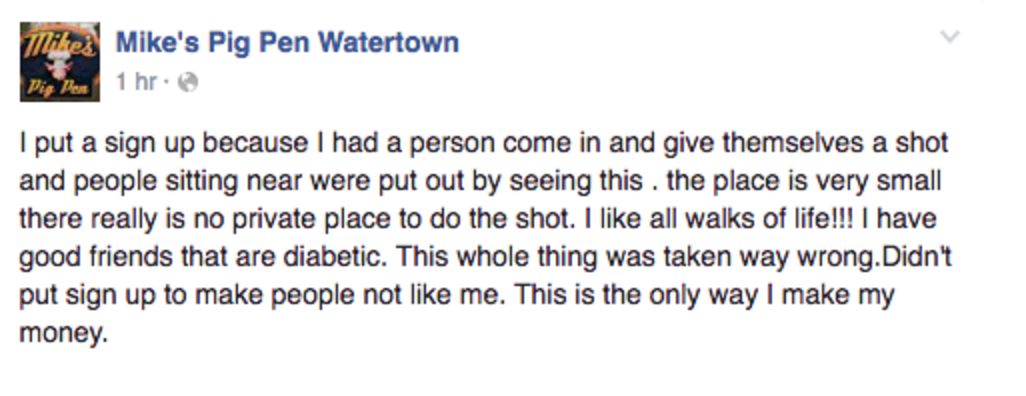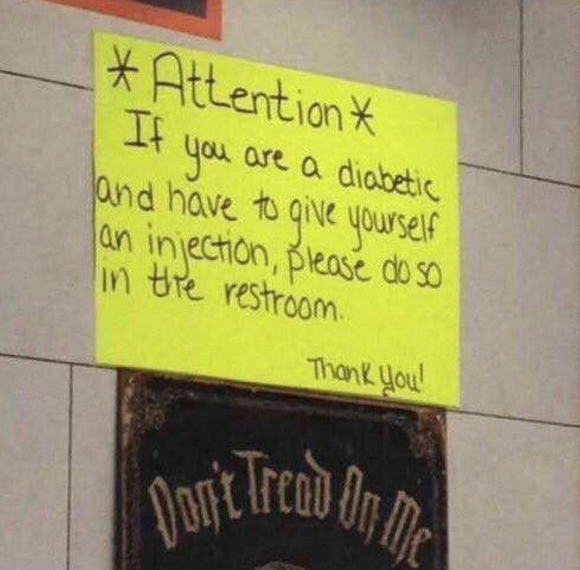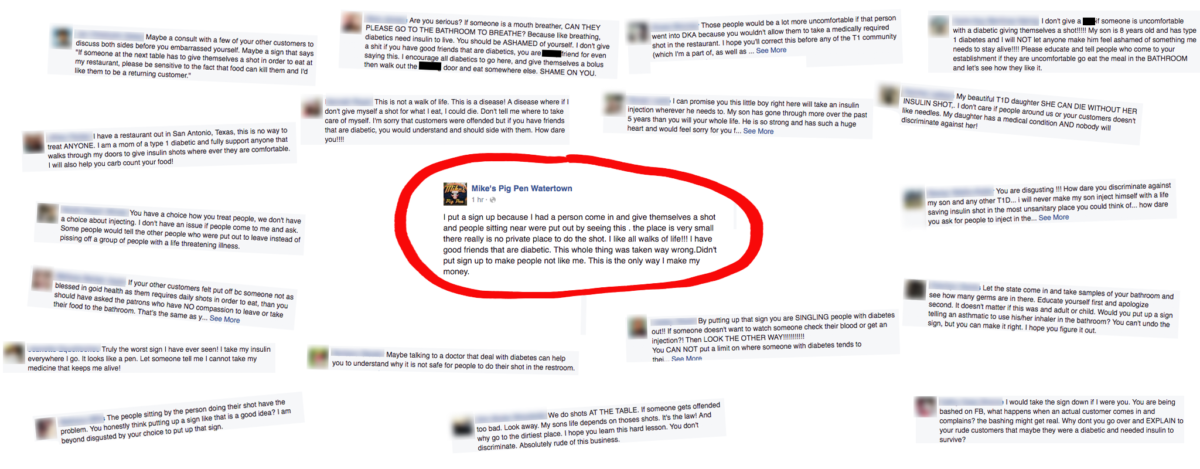Sign in Restaurant Tells Diabetics to Give Insulin in Bathroom
UPDATE: Mike’s Pig Pen owner Michael Cornell issued an apology hours after this publication. In regards to the sign he posted asking people with diabetes to use the bathroom to inject their insulin he said: “I’m really sorry if it (the sign) offended anyone. I had no idea and no clue about it (diabetes).” We applaud Michael for admitting his mistake, further highlighting the need for broader education—something we advocate for daily at Beyond Type 1.
WATERTOWN, NY—Mike’s Pig Pen restaurant recently put up a sign, which requested people with diabetes—type 1 and type 2—to give themselves insulin in the bathroom instead of the public eating area. Insulin is a life-saving medicine that allows those with diabetes to process glucose from food. It is often given before meals and is vital for diabetes treatment in order to stay alive.
After outrage from the community at the discriminatory mandate from the restaurant, the owner of the establishment, Mike Cornell, released this statement on Facebook:

“I put a sign up because I had a person come in and give themselves a shot and people sitting near were put out by seeing this. the place is very small there really is no private place to do the shot. I like all walks of life!!! I have good friends that are diabetic. This whole thing was taken way wrong. Didn’t put sign up to make people not like me. This is the only way I make my money.”
 The sign has since been taken down but the glaring problems with the statement speak to a larger issue of ignorance surrounding chronic illness. People were “put out seeing this” [in reference to the shot] means that because the treatment for diabetes made some patrons uncomfortable, the disabled were asked to remove themselves from the public eye and administer medicine secretly.
The sign has since been taken down but the glaring problems with the statement speak to a larger issue of ignorance surrounding chronic illness. People were “put out seeing this” [in reference to the shot] means that because the treatment for diabetes made some patrons uncomfortable, the disabled were asked to remove themselves from the public eye and administer medicine secretly.
Beyond Type 1’s CEO and Co-Founder Sarah Lucas, said this, “People are entitled to look away if they are ‘uncomfortable’ seeing a shot given, but those with diabetes are also entitled to give themselves life-saving medicine in public, without shame, without stigma.”
As opposed to recognizing that the request for the chronically ill to treat themselves privately is wrong, the restaurant management reiterated its discriminatory mindset, citing the size of the establishment as the reason for posting this. “The place is very small. There really is no private place to do the shot.”
Regardless of what type of diabetes, treating the illness requires constant care so as to prevent morbidity and death. “To forbid somebody from using a life-saving medical treatment because you don’t want to look at it is inhumane,” said Sara Jensen, whose son has type 1 diabetes. “It perpetuates shame for those who have the disease as well.”
Jensen explained, “If my son Henry was low, sitting at the table, ready to eat, and he had to check his blood sugar, he needs to stay put. When your blood sugar drops you can lose 50-80 percent of your brain function. I highly doubt that a restaurant wants my 8-year-old child walking across a restaurant and into a bathroom to do this. He could pass out and crack his head open on the way there. Would you tell an asthmatic to leave the room to treat an asthma attack or someone going into anaphylactic shock to leave the room to use their EpiPen?”
Jensen talked with local news about the importance of educating the public on the matter. “The equipment required for people with diabetes to treat themselves with insulin is portable, convenient and safe. It poses no danger or health hazard to anyone. Kids do it in schools, adults do it on planes, there’s no reason they can’t do it in a burger joint.”
In the aim to prevent signs like this from being posted or any other manner of discrimination against those with diabetes, Beyond Type 1 (co-founded by singer Nick Jonas, venture capitalist Juliet de Baubigny and chef Sam Talbot) continues educational outreach. “We will be working hard to raise awareness and amplify the voice of the united diabetes community that discrimination like this is unacceptable,” said CEO Sarah Lucas. “We believe that through education, we can alleviate fear and ignorance.”
While Mike’s Pig Pen claims, “The whole thing was taken wrong,” it appears that the attitude behind the statement is what is really wrong. The rights for the chronically ill is what’s at stake when signs like these are posted. Taking a sign down is easy; whereas dispelling ignorance around a disease is much more difficult.
It turns out that Mike’s point of view is not unique either. In an article entitled “No Cause Too Trivial” written by managing editor Perry White of the local Watertown Daily Times, it states, “Mike was trying to look out for the interests of the totality of his customers by asking injectors to do it out of their sight.” For starters, calling those with diabetes “injectors” is cause for alarm. It implicates that those with a chronic illness are defined by their necessary treatments. What’s next? Cancer patients being called “the radiated”?
A statement like this also highlights the divide of those with diabetes and those without. When addressing the needs of the “totality of his costumers,” only one side (the non-diabetic) is in fact considered, requesting that treatment happen “out of their sight.” Seeing a person with diabetes treat him/herself doesn’t have fatal implications for the viewers (non-diabetics), whereas regulations that prevent those with diabetes to treat themselves can. Apart from it being medically necessary, administering insulin should not come with added stigma that it is “socially unacceptable.” This further isolates those with the chronic illness. If the totality of the customers were to be considered, then a request like this would certainly be failing in that aim.
Hear what the T1D community had to say about this.






